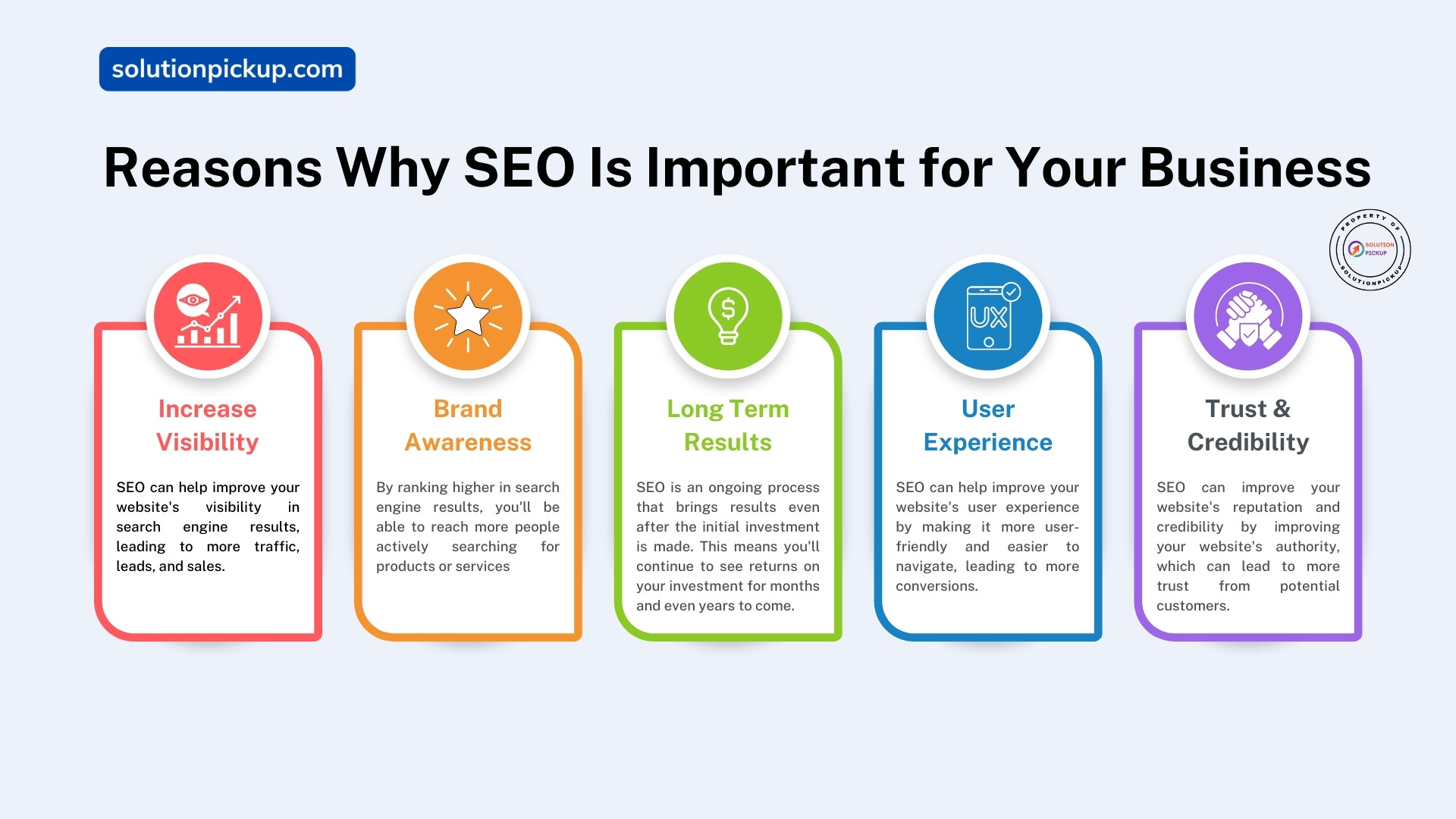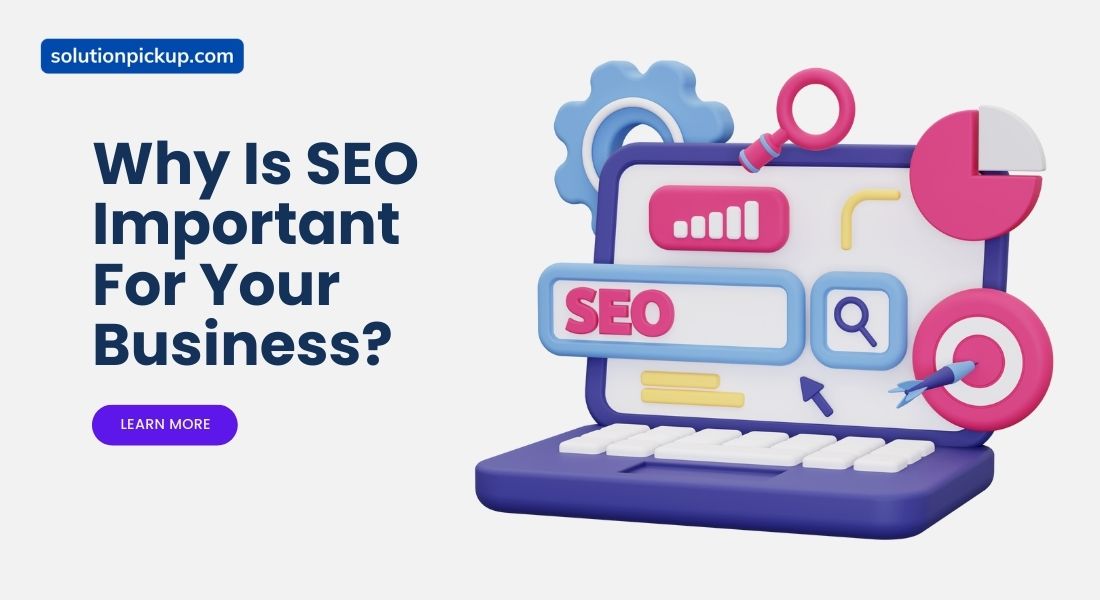Regardless of a company’s size, SEO (search engine optimization) should be integral to any digital marketing strategy. Make your website Google-friendly to attract more visitors and readers.
In addition to the obvious financial benefits, this will also solidify your company’s reputation as an industry leader. Better SEO may help consumers locate relevant content and traverse your website faster.
Search engine optimization is a long-term approach that may assist in promoting sustainable development for your organization at a reasonable cost.
SEO is important for your business for several reasons, including:
- Increased Visibility
- Cost-Effective Marketing
- Brand Awareness
- Competitive Advantage
- Long Term Results
- User Experience
- Trust and Credibility

What is SEO?
SEO, or search engine optimization, boosts a website’s rating on search engine results pages (SERPs). Optimizing content, meta tags, and keywords for search engines like Google, Bing, and Yahoo do this.
SEO makes a website more visible to visitors looking for relevant keywords or phrases, increasing organic traffic. SEO increases a website’s exposure in search engine results, making it more likely to be found when users search for a term or phrase.
Why Is SEO Important for Your Business?
Here are some factors which have key importance:
Increase Organic Traffic:
SEO is one of the best techniques to boost organic traffic. Organic traffic comes from unpaid search results, not advertising. It will rank higher in search engine results pages (SERPs), making it more likely to be found when looking for a certain term or phrase. Effective SEO may also improve the user experience on a website by making it simpler to locate and browse. This increases engagement and conversions. Effective SEO may boost organic traffic by improving search engine rankings and user experience.
Brand Authority:
SEO may make a brand an industry authority. A firm may enhance organic traffic and SERP exposure by optimizing its website for relevant keywords and phrases. This increases engagement and conversions. By constantly providing consumers with high-quality, relevant, and helpful content. A business may become a thought leader and boost brand authority. High SERP rankings for relevant keywords can also convey to search engines that the brand is an authoritative source. Effective SEO may increase a business’s exposure, organic traffic, trust, credibility, and thought leadership.
Target Audience:
SEO target certain audiences. A firm may optimize its website and online content by studying and targeting relevant keywords and phrases to attract searchers. High-quality, relevant, and valuable content boosts engagement and conversions. Understanding the target audience’s search intent and activity helps businesses customize their SEO approach to reach and attract them. A firm may improve its SEO strategy by evaluating website performance and audience behavior. Effective SEO targets a specific audience by optimizing for relevant keywords, adapting content to their search intent and behavior, and continually improving the approach to engage them.
Increased User Experience:
SEO enhances website usability. A firm may improve search engine visibility by improving its website. Organic traffic and interaction may grow. A business also improve user experience by generating high-quality, relevant, and helpful content that makes it simpler for visitors to locate and navigate the site. A firm may also improve user experience using technical SEO best practices like improving page load speed, making the site mobile-friendly, and offering clear and easy-to-use navigation. Effective SEO increases exposure provides relevant and valuable content, and implements technological best practices to make a website more user-friendly.
The Buying Cycle/Research:
SEO can affect consumers’ research and purchase cycles. A firm may enhance organic traffic and SERP exposure by optimizing its website for relevant keywords and phrases. This may raise brand and product awareness. A firm may also educate and inform potential consumers by generating high-quality, relevant, and helpful content. A firm may also persuade clients to buy by providing calls to action and simplifying the buying process. Effective SEO increases brand recognition, provides useful information, and makes it easy for potential buyers to take action and buy.
Offline Sales:
SEO boosts offline sales. A firm may enhance organic traffic and SERP exposure by optimizing its website for relevant keywords and phrases. This increases brand recognition and product interest. Potential clients may also readily identify the business’s location and contact information on the website. A firm may also educate and persuade potential consumers to buy by generating high-quality, relevant, and helpful content. Effective SEO may boost offline sales by raising brand recognition, giving location and contact information, and educating buyers about products and services.
Local SEO:
Local SEO optimizes a business’s website for local customers. It boost exposure and revenue. A company may improve its search engine results page (SERP) ranking for local customers by optimizing its website for local keywords and phrases. Potential clients can also locate the business by providing its location and contact information on the website and in local directories. A firm may educate potential consumers about its products and services by generating high-quality, relevant, and meaningful content. Local review systems also help a firm gain credibility and awareness with potential clients. Strong local SEO may boost a business’s exposure, location, contact information, consumer education, and local reputation.
Measuring:
SEO performance is crucial to strategy evaluation and data-driven decision-making. Google Analytics lets businesses measure website traffic, bounce, and conversion rates. A firm may check its exposure in search engine results pages (SERPs) and change its strategy by monitoring search engine rankings for important keywords. Other SEO success measures include:
- Organic search traffic
- Click-through rate (CTR)
- Time on site
- Pages per session
- Goal completion
- Return on investment (ROI)
A corporation may enhance its strategy and reach its goals by frequently monitoring and assessing key indicators.
Long-term Strategy:
SEO demands ongoing work to produce results. A solid SEO strategy boosts a website’s exposure in search engine results pages (SERPs) and establishes a firm as an industry authority. A firm may attract consumers and become a thought leader by routinely producing high-quality, relevant, and helpful content. A firm may remain ahead of the competition and retain SERP visibility by monitoring and updating its SEO strategy based on data and market trends. SEO may also maintain business development, unlike paid advertising. A great SEO strategy may increase exposure, establish the brand as an authority source, and provide long-term advantages for a firm.
Understanding Your Audience:
Understanding your target audience’s demands, interests, and behavior may help you generate engaging and conversion-boosting content. This includes researching and selecting relevant keywords, optimizing your website for those keywords, and optimizing for audience search intent and behavior. Understanding your audience lets you make data-driven content, tone, and medium decisions. By assessing your website’s performance and audience behavior, you can continually improve your SEO approach to reach and engage your target audience. Understanding your audience helps you develop relevant and valuable content, target the proper audience, and make data-driven decisions to enhance performance.
Stay away from Marketing Strategies That Aren’t Necessary:
As we’ve already said, SEO is often more effective than traditional forms of advertising. To truly understand your clientele and cater to their wants and requirements, you need a strategy that can span many years. Finding new visitors does not require spending a lot of money on sales and advertisements on social media; it only requires providing them with great content and useful information. That way, you can get the word out about your business and build a dedicated following of customers who will spread the word about your offerings via social media.
A Better Load Time:
Did you know that if a website takes more than three seconds to load, 40% of visitors will abandon it? You should give that some serious thought if you haven’t already. Search engine optimization will discount your page unimportant if visitors bounce after only a few seconds. In the end, a poor user experience results from a delayed loading time. Thanks to content optimization, the user experience and conversion rates can benefit from a faster page load time. Website owners have had to consider page speed as a major ranking factor since Google released its core web vitals update.
Be Different from the Rest of the Competition:
Competitors are a fact of life for any industry. Also, superior items aren’t enough to differentiate you from the competition. Spreading the word of your existence is essential. Search engine optimization (SEO) is an excellent tool for little businesses to use when going up against larger ones. By eschewing costly advertisements and instead relying on analytical data from your customers, you can create effective and real tactics. A dedicated client base willing to write reviews and provide feedback regardless of traffic levels is invaluable.
Increase Your Business Through International Research:
Take into account the fact that experts predict the worldwide demand for SEO services will increase to about $103.24 billion by 2025, at a CAGR of 20%. Particularly if you go for a niche market, you may increase your potential customers’ reach, if not in raw numbers, at least in terms of physical distance. You may select which nations to focus on. With the help of visitor behavior tracked using specialized keywords, your team can methodically expand your online presence across many continents.
Make Long Term Investments:
When you put money into search engine optimization tactics, you may not see any returns for up to nine months. Once you have everything set up, you can count on a steady stream of targeted visitors at no cost. You may get your message out to more people faster through sponsored advertisements. However, if your company focuses on making money, only a few customers will remain loyal to your items.
If you’re looking at the big picture, SEO tactics will ensure a dedicated client base that will not only continue to buy your wares but also spread the word about how helpful they find your material.
Don’t Waste Your Money:
Finally, SEO is a cost-effective strategy to increase your business and online visibility. First, study consumer behavior. You may customize your marketing based on site traffic. Second, study your rivals’ keywords, strategies, and actions. Your team may use their successes and failures to identify the best product strategy. Once you rank, you’ll have a particular audience to boost brand recognition and stand out.
Conclusion:
A strong website requires a skilled development team and SEO methods. SEO is vital for another reason. People spent most of their time online in recent years. As their inquiries reveal, buyers are more inclined to buy when a firm delivers relevant information rather than merely selling a product. Find original material and improve your website for visibility, even if it takes time!
Frequently Asked Questions (FAQs)
What are the top 10 benefits of SEO?
Here are the top 10 benefits of SEO:
- Increased Visibility in Search Engine Results
- Higher Website Traffic
- More Leads and Sales
- Cost-Effective Marketing Strategy
- Increased Brand Awareness
- Better User Experience
- Increased Website Credibility
- Long-Term Results
- Better ROI
- Increased Competition Advantage
What are SEO techniques?
Here are a few effective SEO techniques:
- Keyword Research and Optimization
- On-Page Optimization (Title Tags, Meta Descriptions, Header Tags, etc.)
- Content Creation and Optimization
- Link Building and Backlink Analysis
- Technical SEO (Website Structure, Mobile Optimization, Site Speed, etc.)
- Analytics and tracking
- Local SEO (Google My Business Listing, Local Citations)
- Social Media Optimization
- Voice Search Optimization
- International or Multilingual SEO
- Video Optimization
- Rich Snippets and Schema Markup Optimization.
How can I improve my SEO?
A website can be optimized for SEO by optimizing its content, building quality backlinks, researching and using relevant keywords, and regularly updating it with fresh and unique content.
What are keywords for SEO?
In search engines, SEO keywords are words or phrases that people use to find information or products on a website.
What are the 2 types of keywords?
The two main types of keywords are short-tail and long-tail keywords.
What are the backlinks in SEO?
Search engines consider backlinks as ranking factors in search engine optimization (SEO) because they signal to search engines that other sites endorse the content on the linked website.
How do I grow SEO traffic?
By improving your website’s content, technical SEO, backlinks, and user experience, as well as tracking your progress, you can grow SEO traffic.
What are the most common SEO mistakes?
Several common SEO mistakes include keyword over-stuffing, duplicate content, hidden text, irrelevant keywords, using link farms, and neglecting to create a mobile-friendly website.

